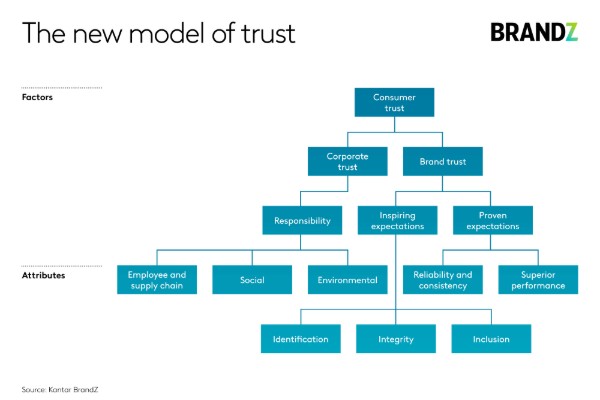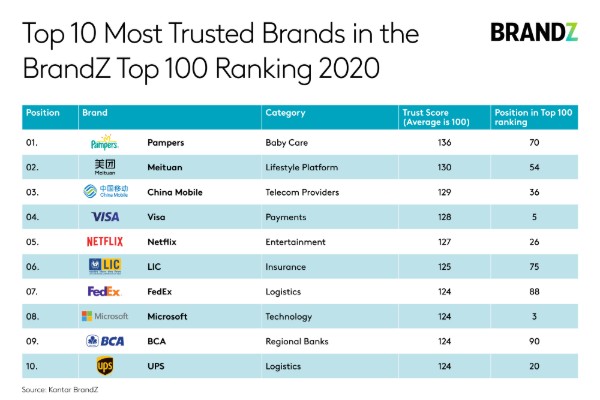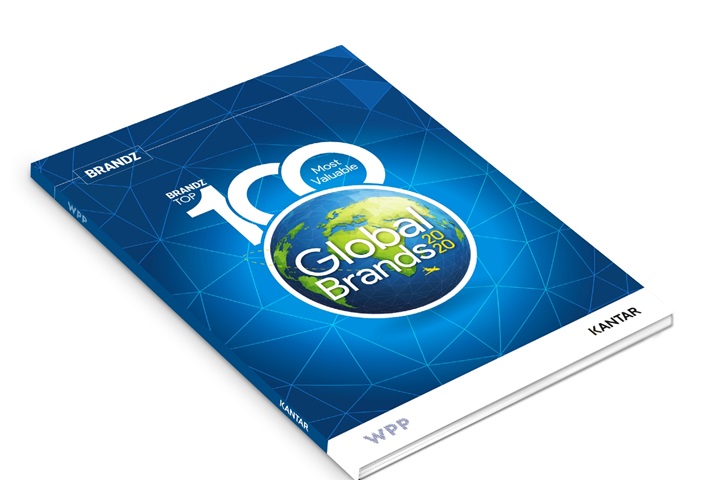The world’s most valuable brands have seen their total brand value increase by 5.9% to almost $5 trillion despite the economic, social and personal impacts of COVID-19, according to the 2020 BrandZ Top 100 Most Valuable Global Brands ranking. It shows that strong brands have been better insulated against global economic and social turmoil so far this year.
But how important is trust today when it comes to brand value? Trust is in fact the foundation stone of all brands. Traditionally, consumers trusted well-established brands based on two factors. First is proven expertise, the knowledge that the brand will ‘do it well,’ reliably and consistently over time. Second is corporate responsibility, which is about the business behind the brand. Does it show concern over the environment, its employees, and so on?
Corporate responsibility has undergone a major transformation in the last decade, and is now three times more important to corporate reputation than 10 years ago. It accounts for 40% of reputation overall, with environmental and social responsibility the most important component, alongside employee responsibility and the supply chain. Take companies like Toyota, leading on sustainability, Nike with its campaigns around social responsibility, and FedEx focusing on employee responsibility. We can see that responsibility is high on the agenda for many in the BrandZ Top 100.
The good news is that trust in the top 100 brands has been increasing not declining, filling the gap as trust declines in other institutions like government and the media. This is being driven largely by consumer concerns over the bigger issues we are facing today. But this isn’t enough.
The new model of trust
At Kantar we have been examining trust for many years and one of the questions we’ve asked is how and why consumers trust brands they hardly know or have never used? Why do we trust Uber the first time we get in a car, or Airbnb the first time we rent an apartment?
The answer is that three key factors are important in building consumer trust and confidence, even when a brand is new to a market. These are:
- Identifying with the needs and values of consumers
- Operating with integrity and honesty
- Inclusivity, i.e. treating every type of consumer equally.
Brands that develop these associations more strongly tend to outperform their competitors in defending and growing their brand value.
This new equation is something we have had to build into our previous understanding. So our ‘new model of trust’ (see diagram below) now has three pillars; alongside proven expertise and corporate responsibility, we have a new quality of ‘inspiring expectation’ driven by our three key factors of identification, integrity and inclusivity.
Most trusted brands
The most trusted brand in this year’s BrandZ Global Top 100 was the US baby care brand, Pampers with a trust score of 136 (with 100 being the average), and scoring over 120 in every market where it was measured. This exceptional level of trust has been driven primarily through its perceived superiority over competitors and relentless technological leadership in its category.
The BrandZ Top 100 Most Valuable Global Brands report and rankings are available to download here.
Examples of other brands in this year’s ranking that have strengthened their trust and responsibility credentials include the Indonesian bank BCA, which has invested in digital technology to improve the user experience, and Coca-Cola, which has re-purposed its hugely powerful communications network to share helpful information during the COVID-19 outbreak.
Established brands, like Pampers and Coca-Cola, would seem to have an advantage when it comes to building the trust factor. But the BrandZ model of trust demonstrates how many new brands have managed to grow fast. Second in the Top 10 most trusted brands was Chinese lifestyle brand Meituan with a trust score of 130. This delivery and online ordering brand, which seems to have come out of nowhere, has clearly demonstrated its understanding of what consumers want and developed a strong reputation for customer care.
Then there’s streaming service Netflix, which scored 127 and was the fifth most trusted brand in our ranking. Netflix has created a strong association with being open and honest compared to other ‘content’ platforms, despite the fact that it uses customer’s personal data.
Younger consumers are demanding something more today and are actively looking for brands that treat people with respect and also as equals. These include hugely successful brands like ride-hailing service Uber, and video-sharing social network TikTok, which was the highest new entry this year into the BrandZ Top 100 ranking at no. 79.
Trust takes time to build. So those brands with a reputation for responsible behaviours in all areas will have a natural advantage over others during times when consumers are more uncertain, fearful or anxious. Even if they have not been available during COVID-19, brands that are already trusted will also be more reassuring to consumers when they return.
Trust delivers both reassurance and simplifies brand choice. With a growing demand for more responsible corporate behaviour, this in turn amplifies the need for brands to act as a positive force in the world. Brands have a unique opportunity to earn valuable trust and help make a difference, providing this is seen to be genuine. Being sincere, empathetic and ensuring your brand remains consistent with its core values will ensure your corporate reputation is not compromised.
Find out how your brand performs on core consumer trust metrics, and on the drivers that influence them in this new BrandZ Perspectives report available on Kantar Marketplace.



